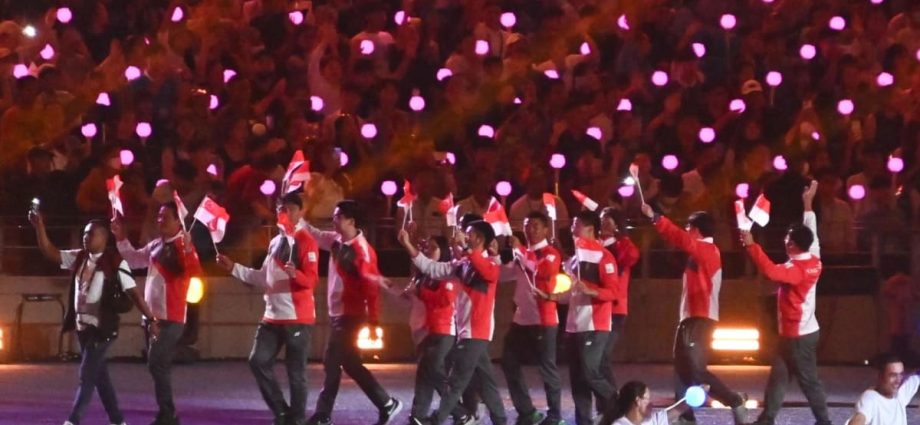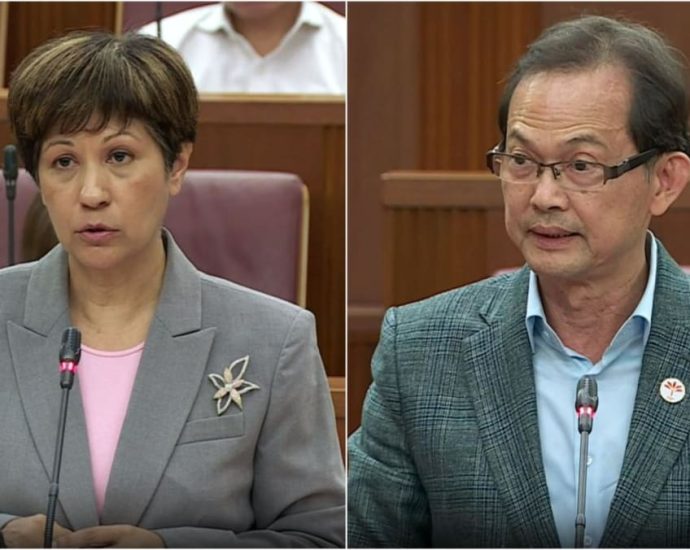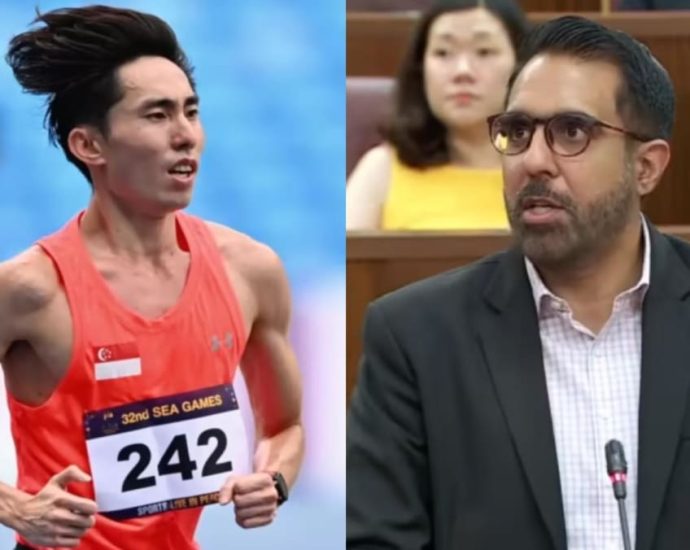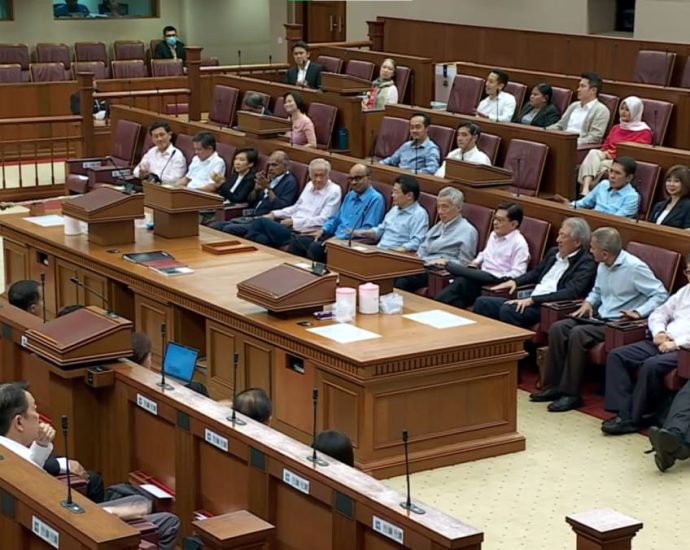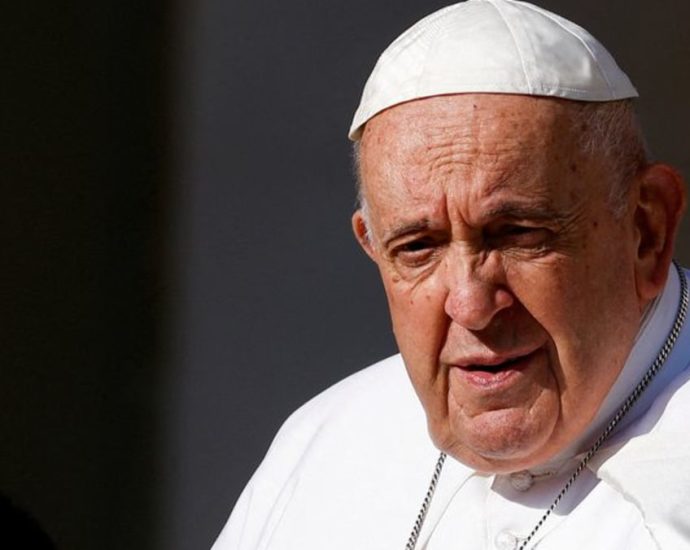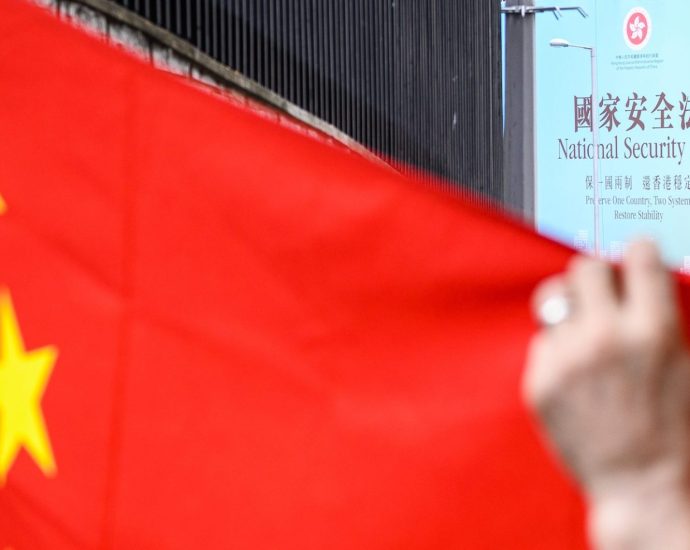Parliament votes in favour of amended WP motion on supporting Singapore’s athletes

SINGAPORE: Members of Parliament on Thursday (Jul 6) voted in favour of a Workers’ Party motion to support the accomplishments of Singapore’s athletes and para-athletes, but stopped short of agreeing to call on the government to re-evaluate its management of sports.
Beyond supporting Singapore’s athletes, the original motion called on the government to “undertake a thorough evaluation of the areas of improvement in Singapore’s sporting ecosystem” and “commit to realising clear, achievable goals for sporting success over the coming decade”.
MP Darryl David (PAP-Ang Mo Kio) proposed to amend the motion to reflect that the government would instead “continue its thorough evaluation”. He also proposed changing “clear, achievable goals for sporting success” to “our goals in sports”.
All MPs from WP and the Progress Singapore Party’s Non-Constituency MPs who were present voted against these two amendments. The amendments were passed with a majority.
The majority of the house then voted in favour of the amended motion, while all MPs from WP and PSP’s NCMPs who were present voted against the amended motion.
In his closing speech, Associate Professor Jamus Lim (WP-Sengkang) said WP could not support Mr David’s amendments in full, though it would be willing to “stand corrected”.
“While we accept that the government has indicated that they have performed a number of reviews and continues to monitor performance, we’ve not seen the concrete fruits of such thorough evaluations for the sporting ecosystem as a whole,” he added, calling for the government to commit to releasing a report or review documenting this effort.
The party also did not support the other amendment because it “wiggles out of one of the most important fundamentals for sporting performance” – appropriately defining success, said Assoc Prof Lim.
“It is important to have clarity on what our goals are, and ideally set up not only eventual but also intermediate targets that we can credibly achieve,” he added.
“Accepting the amendment also robs us of being able to meet the sort of mass participation goals that we alluded to that are imminently achievable. We also doubt that the government would be comfortable with such ambiguity for other endeavours.”
Based on Singapore’s income, the country has “unfortunately not only punched way below our weight” in terms of sporting achievements, but has “consistently gotten worse”, said Assoc Prof Lim in his opening speech.
“What explains our nation’s anomalous outcomes? As it turns out, money alone is not enough. Countries that have prioritised sporting achievement, including at the highest level, know that this prioritisation is what is important,” he added.
During the five-hour debate, Senior Parliamentary Secretary for the Ministry of Culture, Community and Youth Eric Chua supported the amended motion, and stressed that regular and consistent reviews are conducted as part of Singapore’s high-performance sports ecosystem.
“Through our review, we examine what has worked, what has not worked, what we could do differently and chart our future priorities,” he continued.
“Our goal is to win of course, but we must accurately define what winning is.”
While Singapore cannot compete directly with countries with large populations, it has also performed well in many sports, including swimming, sailing, table tennis, badminton and silat.
Recalling a previous conversation with national badminton player Loh Kean Yew about the expectations Singaporeans have for him, Mr Chua called for the country to be more sensitive and supportive.
“The weight of an entire nation’s expectations was squarely on this young man’s shoulders, and he was fully aware of that. Perhaps overly so,” he added.
Mr Chua urged Singaporeans to “not forget that it is not all just about medals”.
“Rather, it is about journeying with our athletes as they work through their daily struggles in realising their maximum potential.”
PSP apologises for ‘misleading’ video on Ridout Road parliament debate
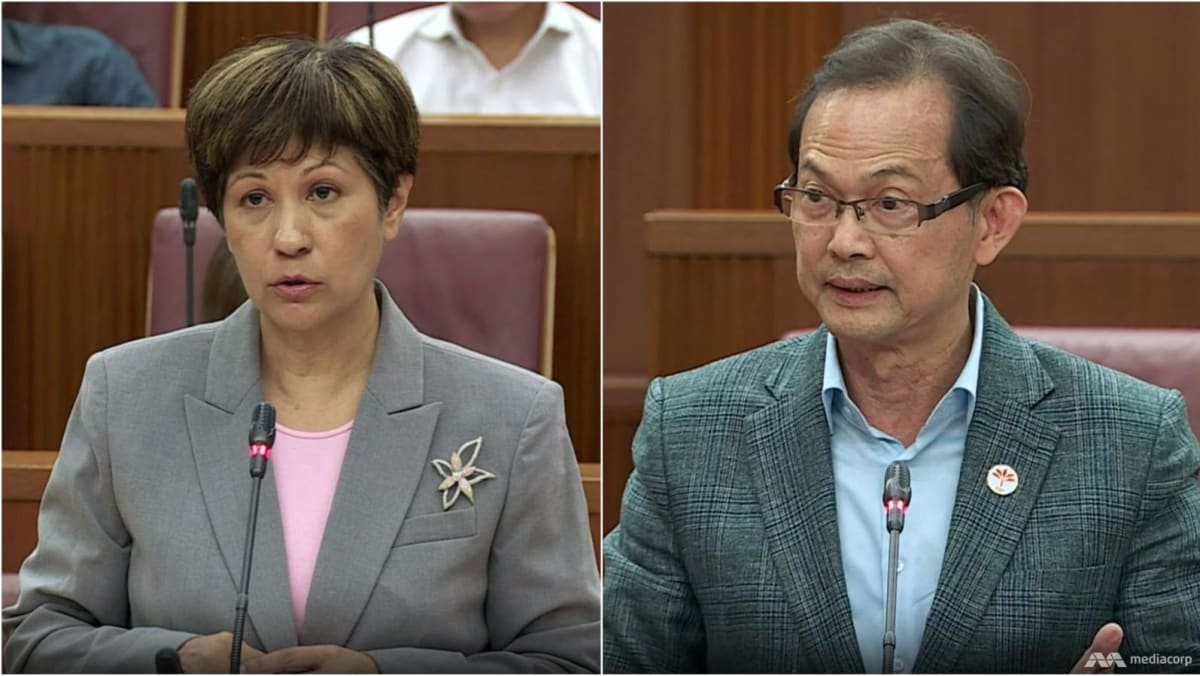
Ms Indranee said she had written to the PSP to formally request that Mr Leong and the party remove the revised Facebook post and edited video put up on Thursday morning, and to post an apology on all the social media pages the video had appeared on by 10pm the same day.
Otherwise, she would have had “no choice” but to refer the matter to the Committee of Privileges, said Ms Indranee.
In parliament, Mr Leong tried to argue his case by pointing out that the PSP had removed inaccuracies about how much time was spent on clarifications. He also reiterated that Ms Indranee had misunderstood who the “sia suay” phrase in the video’s caption referred to.
“Sia suay” is a Hokkien expression to indicate embarrassment or disgrace.
The edited post had read: “In what some online commenters are calling another ‘sia suay’ moment by our NCMP Leong Mun Wai –
“Our NCMP Leong Mun Wai was informed by the deputy speaker that members were allowed to seek clarification but not debate about the ministerial statements concerning the Ridout Road incident.
“The PSP’s Leong Mun Wai & Hazel Poa Koon Koon are here to do whatever it takes to ensure that the voice of the people is heard.
“This short video is an excerpt taken from the full parliamentary session and is not to be taken as a representation of the entire discussion that took place in the House on Jul 3, 2023.”
In the House on Thursday, Mr Leong said: “We should be entitled to a different view … We should not be forced to present only the view that you want to present. This is a democratic parliament, not a rubber-stamp parliament.”
He also asked Ms Indranee to confirm if an apology was necessary if PSP took down the video, as the party did not “impugn” anyone and he was of the view there was no requirement to say sorry.
Mr Leong also proposed putting up an open letter to express their regret on the matter.
Ms Indranee said sternly that an apology was needed. “The reason is this: The parliamentary privileges, the conduct of parliament are important things. They underpin our democracy.”
She added that for a democracy to function properly, it must work on the basis that MPs and their political parties will speak truthfully to people and give accurate representations of what happened in parliament.
“Because that determines the kind of society we are and if you have a political party which has misrepresented what has happened in parliament, which is a direct strike at the values that underpin this parliament, you should apologise because it’s not the right thing to do.”
Pita invites Taylor Swift to Thailand
Aspiring PM tells pop star who cancelled after 2014 coup that country is ‘fully democratic’ now

Taylor Swift is coming to Southeast Asia next year but fans will have to go to Singapore if they want to see her.
But if Pita Limjaroenrat has his way, the American pop megastar will add Thailand to her itinerary. After all, he said, she’s overdue for an appearance here, having cancelled a planned performance in 2014 shortly after the military coup.
The Move Forward party leader and prime ministerial candidate made the pitch on Wednesday evening on Twitter in response to a tweet from Swift about new dates being added to the European leg of her Eras Tour in 2024. He wrote:
“Hey Taylor! Big fan of yours. Btw, Thailand is back on track to be fully democratic after you had to cancel last time due to the coup. The Thai people have spoken via the election and we all look forward to welcoming you to this beautiful nation of ours!
Do come and I’ll be singing Lavender Haze with you!
– Tim”
Swift was scheduled to play a sold-out show in Bangkok on June 9, 2014. But a curfew was in place in the immediate aftermath of the military coup staged by Gen Prayut Chan-o-cha on May 22 of that year.
Organisers BEC-Tero announced on May 27 that the concert was being cancelled “due to recent events”. It did not elaborate.
The singer played some other dates in June of that year but the Bangkok show was never rescheduled.
Swift is scheduled to play six shows in Singapore starting on March 2 next year. Online presales of tickets opened on Wednesday with more than a million people reported to have been in the queue.
Hey Taylor! Big fan of yours. Btw, Thailand is back on track to be fully democratic after you had to cancel last time due to the coup. The Thai people have spoken via the election and we all look forward to welcoming you to this beautiful nation of ours!
Do come and I’ll be… https://t.co/ypox90kRpL
— Pita Limjaroenrat (@Pita_MFP) July 6, 2023
Pritam asks SNOC to adopt âforgiving attitudeâ on Soh Rui Yong after Asian Games exclusion
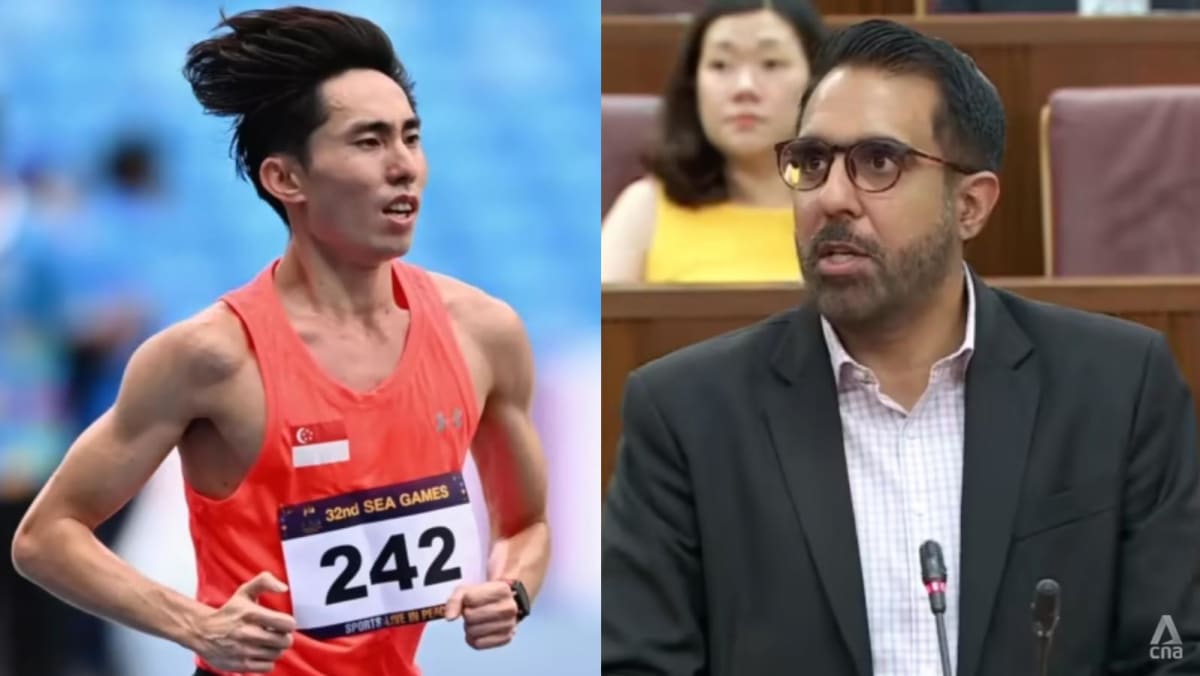
Mr Singh acknowledged that SNOC had done much to promote Singapore sports, by bringing sponsors on board and raising the esteem of sports in the minds and hearts of Singaporeans and many parents in a “very big way”.
“But in the eyes of many Singaporeans on the Soh Rui Yong matter, SNOC as the highest sporting body in Singapore comes out looking petty even as many also believe that Rui Yong needs to learn from the past and draw a line and focus on his sporting career,” said the WP secretary-general.
Nominated Member of Parliament (NMP) Mark Chay, who is also a member of SNOC’s marketing committee, clarified that the council’s appeals committee was satisfied with the Singapore Athletics Association’s nomination of Soh to represent Singapore at this year’s SEA Games.
Soh had also signed a letter of undertaking to abide by the association’s code of conduct.
But upon returning from the SEA Games, he made disparaging comments about SNOC and his teammates on social media, said Mr Chay.
He said Soh was an athlete who “has been given a second chance and knowingly breaks the undertaking and commitment”.
“I think if Rui Yong is truly sorry, and he really wants to move forward, and wants to be a great ambassador for sports, the door is probably not closed,” said Mr Chay, in response to Mr Singh asking if he would advocate for more dispute resolution mechanisms.
POLITICIANS SHOULD NOT BE DIRECTLY INVOLVED IN SPORTS: PRITAM SINGH
Mr Singh also called on the government to intervene.
“I hope the ministry officials, if not the minister in charge of sports, can intercede to prevent parties from reaching a point where Singapore sport cuts off its nose to spite its own face,” he added.
“Politicians should not be directly involved in sports, if only to facilitate raising the profile of Singapore sports and athletes; generating support from corporates, society and parents; and to bring wisdom into disputes like those involving Soh and SNOC.”
Mr Singh did not say who he was referring to.
“Our sports administrators can afford to take an elevated approach as they have done in the past and be more big-hearted, especially when you consider their collective seniority and contributions to Singapore sports,” he said.
The Leader of the Opposition called for a “more enlightened and mature approach” from all involved.
“(SNOC) does not just hold all the cards, but it’s clearly the party in which the power relationship between athlete and state representation resides can make a massive difference,” Mr Singh added.
He expressed hope that the matter could be resolved amicably, with better engagement by perhaps a mediator from the Ministry of Culture, Community and Youth.
“Our sporting ecosystem is strengthened when we focus on sporting values, sportsmanship and bringing glory to Singapore,” said Mr Singh.
Parliament pays tribute to Tharman Shanmugaratnam on his last sitting day
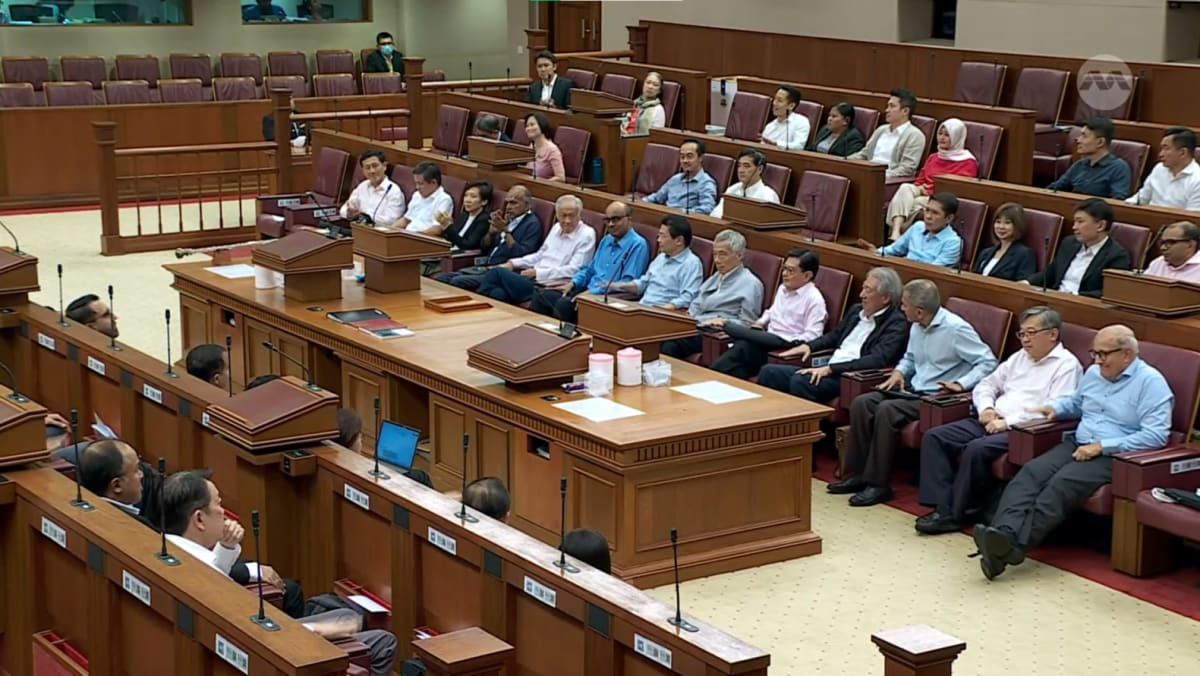
SIMPLIFYING COMPLEX ECONOMIC PRINCIPLES THARMAN’S “GREATEST GIFT”
In a short speech towards the end of Thursday’s sitting, Ms Indranee called Mr Tharman’s ability to simplify complex economic principles as his “greatest gift”.
“I think SM’s (Senior Minister) greatest gift is really in making very complex economic principles sound simple. At least I thought they sounded simple. They sounded very profound; you weren’t quite sure exactly what he was saying, but it sounded like they made a lot of sense,” she said.
“We will miss SM Tharman in this chamber, not least his commanding presence and his erudite speeches,” she added.
“But also (we) will miss his wit and his dry humour. I think, most of all, we will miss a friend and a fellow Member of Parliament.”
Ms Indranee told the House that she and Mr Tharman entered parliament in the same batch in 2001.
Mr Tharman has since held various ministerial appointments, including Minister for Education, Minister for Finance, Deputy Prime Minister, Coordinating Minister for Economic and Social Policies and Senior Minister.
Ms Indranee outlined his various contributions in each role, including seeing Singapore through the global financial crisis of 2007 to 2009 as Finance Minister, removing streaming at primary levels as Education Minister, as well as leading the SkillsFuture programme to encourage lifelong learning and upskilling among Singaporeans in his economic and manpower portfolios.
Mr Tharman also chaired the National Jobs Council during the COVID-19 pandemic to safeguard jobs and create employment and training opportunities for Singaporeans.
RECOGNITION FOR NMPs
Ms Indranee also highlighted that Thursday’s parliamentary sitting marked the end of the term for the current cohort of nine Nominated Members of Parliament (NMPs) and thanked them for their service.
Mr Abdul Samad Abdul Wahab, Ms Janet Ang, Mr Mark Chay, Mr Cheng Hsing Yao, Professor Hoon Hian Teck, Professor Koh Lian Pin, Mr Joshua Thomas Raj, Dr Shahira Abdullah and Dr Tan Yia Swam joined parliament in “most unusual circumstances” in the midst of a global pandemic, said Ms Indranee.
The NMPs covered “several important milestones” during their tenure, she noted.
These include measures to tackle the COVID-19 pandemic and position Singapore for a post-pandemic future, Singapore’s Green Plan, the White Paper on Women’s Development, the repeal of Section 377A and the Constitutional Amendment regarding challenges to the definition of marriage, as well as support for the GST (Goods and Services Tax) Bill.
“They champion causes they care deeply about, ranging from economic growth and employment opportunities, healthcare, sports, and sustainability,” added Ms Indranee.
“They have presented their views passionately and contributed constructively to the robust debates in this House over the last two years. They were also mindful of what this parliament represents and stands for.”
She recalled Mr Cheng’s cut during the Committee of Supply debates earlier this year on “an effective parliament and what that means, as well as the values and principles which underpin it”.
“By their participation in this parliament, they have helped to achieve this current state of affairs,” she added.
“I hope the NMPs will remember their time in parliament fondly, and that they will continue to give close attention to issues of national interest, follow parliamentary proceedings, and contribute to our national building efforts in their personal or professional capacities.”
At least S$480,000 lost in concert ticket scams since January, over 460 in Singapore cheated
They would then contact the scammers via the platform’s in-app messaging function or be redirected to messaging apps such as WhatsApp, Telegram or WeChat to purchase the tickets. When asked if the tickets were authentic, scammers would then provide screenshots and videos of fake tickets or receipts. “To urge victimsContinue Reading
Recovering pope will go to Mongolia, Vatican confirms
VATICAN CITY: Pope Francis will travel to Mongolia at the end of August, the Vatican confirmed on Thursday (Jul 6), indicating that his health is improving well enough after surgery to be able to go to the remotest area he has ever visited. The Vatican issued a detailed schedule forContinue Reading
Dutch museums to return art and artefacts looted from Sri Lanka, Indonesia
THE HAGUE, Netherlands: Two Dutch museums are handing hundreds of cultural artefacts back to Indonesia and Sri Lanka — from a richly decorated cannon to precious metals and jewellery — that were taken, often by force, in the colonial era. The government announced the planned restitution of 478 “cultural objects”Continue Reading
50 consumer complaints filed against e-commerce firm Mdada in span of six months

SINGAPORE: The Consumers Association of Singapore (CASE) has received 50 complaints against e-commerce firm Mdada between Jan 1 and Jun 30, 2023.
These were generally from consumers who did not receive their orders within committed delivery timeframes.
Other complaints included incomplete deliveries, delays in receiving refunds for non-deliveries and defective or incorrect products, CASE President Mr Melvin Yong said in a statement on Thursday (Jul 6).
“CASE has written to Mdada to seek resolution for the outstanding complaints,” he added.
Singapore-based Mdada, founded in September 2020 by hairstylist Addy Lee, actor-host Pornsak Prajakwit and actress Michelle Chia, describes itself as the “fastest-growing and largest” livestream commerce multi-channel in Southeast Asia.
It offers a range of beauty and lifestyle products, as well as luxury items.
According to Mr Yong, at least four consumers are yet to receive orders or refunds as of Tuesday, despite Mdada’s commitment to resolve all outstanding orders by June.
“If Mdada is unable to fulfil outstanding orders or if affected consumers no longer wish to proceed with their orders due to the extended delay, they should effect the refund expeditiously,” he said.
“It is unfair for Mdada to hold on to consumers’ monies indefinitely if they are unable to fulfil the orders.”
On Wednesday, the company posted an apology on Facebook, asking customers to bear with them for “a little more” as they settle “teething issues”.
Mdada said it has “progressively paid out refunds for orders that are out of stock or have experienced inordinate delays in shipments”.
Overseas shipments are being expedited to reach customers as soon as they arrive in Singapore, it added.
“Due to manpower shortage, longer processing time is required, impacting our operations,” said the firm, while promising to ensure communication with customers via WhatsApp to be “as painless as possible, with almost immediate” responses and updates.
CNA has contacted Mdada for more information.
Affected customers may approach CASE for assistance via their website or their hotline at 6277-5100.
Beijing overreaching for exiled HK dissidents
The Hong Kong government has extended its efforts to suppress political dissent overseas, issuing arrest warrants for eight exiled pro-democracy figures and offering bounties of HK$1 million (US$128,000) each.
The targeted pro-democracy figures, who now live in Australia, the US and UK, were selected from a longer list of wanted dissidents. There is a curated feel to their profiles – three ex-legislators, three activists, a unionist and a lawyer – that suggests the list is symbolic, as well as pragmatic.
It is reminiscent of the infamous “Umbrella Nine” trial that capped years of prosecutions after Hong Kong’s 2014 “Umbrella Movement” protests. Three academics, three politicians and three activists were tried and convicted together to send a message to “troublesome” sectors of civil society.
The mugshots of those issued with arrest warrants this week depict not gun-slinging outlaws, but amiable-looking intellectual types.
Their “very serious crimes”, according to police, consist mostly of calling for sanctions to turn the tide of political repression in Hong Kong. In the terms of the controversial national security law under which the warrants were issued, this is considered “subversion of state power”, an offence punishable by up to life imprisonment.
How extradition with Hong Kong works
Hong Kong is nominally a self-governing region of China under the “one country, two systems” model agreed to when the UK handed the territory back in 1997.
However, the national security law was drafted in Beijing and applied to Hong Kong after the tumultuous, protracted protests that gripped the city in 2019. These were prompted, ironically, by fears the region’s autonomy was breaking down.
A curious feature of the national security law is its purported extraterritorial effect. It claims jurisdiction over any person of any nationality who has committed any of its offences anywhere in the world.
Whether the Hong Kong government can realistically bring these people to trial is another matter entirely.
The international law of extradition (technically, in Hong Kong’s case, the surrender of fugitive offenders, as only states engage in extradition) includes certain safeguards. The act must be a sufficiently serious crime in both places, and it must not be a political offence.
The warrants in question fail both of these tests, notwithstanding the Hong Kong government’s hyperbolic claims about national security.
Moreover, extradition is guided by bilateral agreements between jurisdictions. Numerous Western countries, including the UK, US, Australia, Canada and New Zealand, suspended their extradition agreements with Hong Kong when the national security law was imposed, foreseeing the politicization of criminal justice.

The pro-democracy figures targeted this week knew which way the wind was blowing when they left Hong Kong. They will probably never return there, a sad fact to which they may already be reconciled.
However, they may also need to reconsider their travel to jurisdictions which do maintain extradition agreements with Hong Kong or China.
The risk goes beyond formal arrest and extradition. The bounties on offer may encourage vigilantism, and sympathetic governments may turn a blind eye to or even facilitate extra-legal rendition of the eight exiled activists.
This is illustrated by the 2015 case of the five Hong Kong booksellers who disappeared from various locations, including Thailand, and later showed up in China where they “confessed” to crimes in the state media.
The existence of overseas dissidents has long rankled Beijing – as the lifetime of spats with the Dalai Lama illustrates – but in recent years it has shown increased determination to monitor and influence the overseas Chinese diaspora.
The government has even set up secret “overseas police offices” in Europe, North America and elsewhere, as bases for information-gathering and harassment.
Hong Kong brought to heel
In the past, China and Hong Kong could be regarded as distinct political entities, but over the last decade, the “firewall” between the mainland and the region has gradually collapsed. Hong Kong’s government and political system have been stripped of democratic elements, and its national security and law enforcement apparatus are now dictated by the mainland.
Compared with its mainland counterpart, the Hong Kong government goes to greater pains to paper over its actions with a veneer of law and legal process.
However, this tactic is increasingly transparent as it ramps up its pursuit of authoritarian goals. The cooption of Hong Kong’s once-celebrated legal institutions undermines their already-damaged legitimacy.
Hong Kong’s civil society has been brought to heel via a suite of repressive reforms spanning the legal, political, education and media sectors. These new warrants are the latest sign that China will never stop trying to muzzle its critics, so long as they are willing to speak out.
Ultimately, these warrants may be futile overreach – for the sake of their targets, we can only hope that is so – but the intention behind them remains condemnable.
Brendan Clift is Lecturer, The University of Melbourne
This article is republished from The Conversation under a Creative Commons license. Read the original article.

